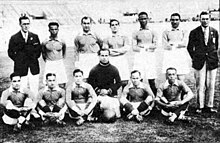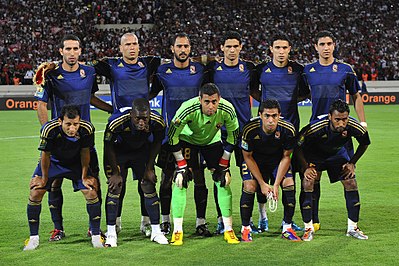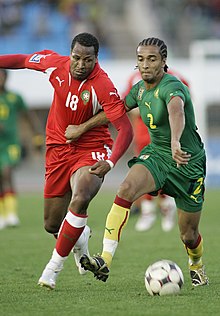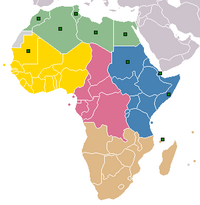Our website is made possible by displaying online advertisements to our visitors.
Please consider supporting us by disabling your ad blocker.
Portal:Football in Africa
Introduction
Football is the most popular sport in Africa, alongside basketball. Indeed, football is probably the most popular sport in almost every African country, although rugby and cricket are also very popular in South Africa. The first football stadium to be built in Africa was the Alexandria Stadium in 1929.
The English Premier League is the most popular sports league in Africa. The most popular clubs in Africa are Arsenal, Chelsea and Manchester United. (Full article...)
This section may be unbalanced toward certain viewpoints. (October 2022) |

Selected article -
Tunisia's first match after independence was against Libya, which they won 4–2. Periods of regular Tunisian representation at the highest international level, from 1962 to 1978, from 1994 to 2008 and again from 2014 onwards. The team qualified for the FIFA World Cup for the first time in 1978, and became the first African and Arab team to win a world cup match by beating Mexico 3–1 in the first match, they have since qualified six times and never making it past the group stage. The team qualified for the Africa Cup of Nations 22 times, the first time was in 1962 and won the title in 2004 when they hosted the event after beating Morocco in the final. Tunisia qualified for the FIFA Confederations Cup in 2005 and was eliminated in the group stage. The team won the African Nations Championship in 2011 by beating Angola in the final and the FIFA Arab Cup in 1963, eventually winning with 8 points on their first participation.
Radhi Jaïdi, with 105 international matches, holds the record for the number of matches played on the Tunisian national team while Issam Jemâa, with 36 goals, is their all-time highest scorer. The highest rank reached by the team in the FIFA Men's World Ranking is 14th in April and May 2018, while their lowest rank is 65th in July 2010. Tunisia holds the record for most African Cup of Nations attended, appearing at seventeen consecutive tournaments. They have not been absent from the competition since the 1994 edition.
Selected biography -
Gyan began his career in 2003 with Ghanaian Premier League club Liberty Professionals scoring a prolific ten goals in sixteen matches then spent three seasons with Serie A club Udinese via two seasons loan at Modena netting on fifteen occasions in fifty-three league matches and at Udinese where he scored eleven times in thirty-nine league matches. In 2008, Gyan joined Ligue 1 club Rennes, netting fourteen times in forty-eight league matches during two seasons. In 2010, Gyan joined Premier League club Sunderland, breaking the club's transfer record and netting on ten occasions in thirty-four Premier League matches during two seasons. In 2011, Gyan joined Al Ain of the UAE Pro-League on loan and become the league's top-goalscorer, scoring twenty-four times in twenty-seven matches. In the following season, Gyan permanently joined Al Ain and once again became the league's top-goalscorer while he helped Al Ain retain the UAE Pro-League title, scoring an impressive twenty-eight goals in thirty-two matches. In the 2013–14 season, Gyan prolifically scored on forty-four occasions in forty matches with Al Ain.
Gyan is the all-time leading goalscorer of the Ghana national team. He represented his nation at the 2006 World Cup scoring the fastest goal of the tournament after 68 seconds, 2010 and 2014 FIFA World Cups, scoring three goals in 2010, and also missing a crucial penalty kick in the last minute of extra-time in a quarter-final defeat at the hands of Uruguay. In 2014, at the 2014 World Cup Gyan became the top African goalscorer in the history of the World Cup.
Selected image -
 |
Players of Al Ahly pose for a team photo before a match in 2011. The Egyptian side is the most successful club in both Egyptian and African football history, having won the CAF Champions League a record 8 times and the CAF Super Cup a record 6 times. They have also won the Egyptian Premier League a record 37 times, the Egypt Cup a record 35 times and the Egyptian Super Cup a record 7 times.
Subcategories
Related portals
More sports portals
WikiProjects
Related task forces and sub-projects
African football task force
WikiProject Africa • WikiProject Football
WikiProject Football task forces and sub-projects
 | |
| Wikipedia ads | file info – #250 |
Topics
Open tasks

- Expand stubs: Competitions in Africa • Organizations
- Expand club articles of teams from Africa.
- Expand biographies of Africans involved in football.
- Create: Requested articles • Most wanted football articles • Requested general football articles
- Add: Infoboxes • Images (General requests, Requested images of people)
- Review: articles currently under review
- Assess: Assessment requests • Assess an article
- Revert vandalism on this portal and on African football articles
- Assist in maintaining this portal and keeping its selected content up to date.
- WikiNews: Create and submit news stories about African football for Wikipedia's sister project WikiNews.
Associated Wikimedia
The following Wikimedia Foundation sister projects provide more on this subject:
-
Commons
Free media repository -
Wikibooks
Free textbooks and manuals -
Wikidata
Free knowledge base -
Wikinews
Free-content news -
Wikiquote
Collection of quotations -
Wikisource
Free-content library -
Wikiversity
Free learning tools -
Wiktionary
Dictionary and thesaurus
More portals
Sources

- ^ "The History Of Soccer In Africa". NPR.org. 2010-06-09. Retrieved 2016-03-31.
- ^ a b c Alegi, Peter (2010). African Soccerscapes. Ohio University Press. pp. 1–2. ISBN 9780896802780.
- ^ Frimpong, Enoch Darfah. "Ghana news: A world of superstition, frustration and disillusionment - Graphic Online". Retrieved 23 September 2017.
- ^ Lacey, Marc (8 August 2002). "Kangemi Journal; For Spellbinding Soccer, the Juju Man's on the Ball". The New York Times. NY Times. Retrieved 2016-03-31.
- ^ "World Cup Witchcraft: Africa Teams Turn to Magic for Aid". National Geographic. Archived from the original on July 10, 2006. Retrieved 2016-03-31.
- ^ Andy Mitten (September 2010). The Rough Guide to Cult Football. Rough Guides UK. ISBN 9781405387965. Retrieved 2016-04-02.
- ^ "African Nations Cup overshadowed by hocus pocus | Football". The Guardian. Retrieved 2016-04-09.
- ^ Kuper, Simon (2006). Soccer Against the Enemy: How the World's Most Popular Sport Starts and Stops Wars, Fuels Revolutions, and Keeps Dictators in Power. Nation Books. p. 123. ISBN 978-1-56025-878-0.
Previous Page Next Page




























